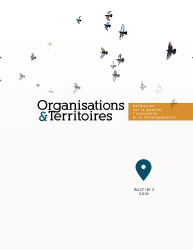De l’éthique de la relation à l’estime de soi : marqueurs d’une dynamique sociale
DOI:
https://doi.org/10.1522/revueot.v27n3.934Keywords:
Ethics, self-esteemAbstract
In traditional societies everyone’s desires and behavior took place in the frame/yoke of the communities, a holistic society where everybody’s self-esteem is the result of a collective oversight and of one’s adaptability to the existing norms. Where no regulations are at work, the modern individual bears the stress of an inaccessible autonomy in the context of a complex organization. It implies that concretely, not only should everybody be given access to knowledge and professional know-hows, but also be instructed to master a minimum degree of ethical strength, the later being some sort of compass warranting that they will be able to act without fear of being censored. Several associations, clubs, companies, medical and care institutions have experienced such a mode of existence. They ensure him/ her a form of freedom where “it is possible to agree as well as to resist”. The challenge is to find out “how the strong can practice respect towards those that are bound to remain weak”. The result is that sense is given to our action here and now, and that it reduces the anomy of institutions in crisis.



